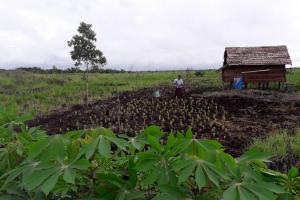Big NGOs’ support of REDD projects help polluter corporations to greenwash their image.
The Green Economy
The Green Economy is a tactic used to “clean up” the image of corporations rather than address corporate capture and capitalism as the true drivers of deforestation. False solutions promoted under the Green Economy include certification, sustainable forest management, ecosystem services, REDD+, the bioeconomy, nature-based climate solutions, and zero net deforestation. Rather than stopping it, these “solutions” support corporate-driven destruction that is causing a deep social and ecological crisis.
Bulletin articles
14 December 2012
Article based on a field visit and conversations with villagers in 5 of the 7 most affected communities by this project.
Bulletin articles
14 December 2012
Testimonies of community women impacted by carbon and forest conservation projects that today are included in the so-called Green Economy.
Bulletin articles
14 December 2012
Social organizations try to prevent a Chiapas-California REDD agreement from going forward. They denounce the potential for increased emissions in California on the one hand and landgrabs in Chiapas on the other.
Bulletin articles
14 December 2012
Costa Rica is currently known throughout the world for its efforts in forest conservation. This “success” is mainly attributable to its Payment for Environmental Services (or PSA for its initials in Spanish), a forerunner to the REDD program in Costa Rica.
Other information
14 December 2012
By Sindicato dos Trabalhadores Rurais de Xapuri – Federação do Povo Huni Kui do Acre.
What are the real problems of forest peoples in Acre?
Why aren’t REDD and environmental services a solution to these problems?
What concerns forest peoples about REDD and environmental services?
Download the full document here
Other information
14 December 2012
New report: “REDD-plus schemes in El Salvador: Low profile, friendly fancy dresses and commodification of ecosystems and territories”
Other information
14 December 2012
The news source Mending News checks in with IEN (Indigenous Environmental Network) Executive Director, Tom Goldtooth, to get the download on the real story of REDD, the deceptive climate 'solution' proposed by the UN. It sounds good on paper "Reducing Emissions from Deforestation and Forest Degradation in Developing Countries" but the reality is that REDD enforces the global colonization of mother earth and a stolen future.
Bulletin articles
14 December 2012
A story of the peoples of the Atlantic Forest in southern Brazil in a disputed territory where the green economy competes with community-based economies.
Multimedia
11 December 2012
Produced by the World Rainforest Movement
Interviews: Winnie Overbeek
Camera and Edition: Flavio Pazos.
A story of the peoples of the Atlantic Forest in southern Brazil.
In Brazil, the Atlantic Forest, which covered the country's entire coastline 500 years ago, is seriously endangered.
Other information
25 November 2012
by Winfridus Overbeek
Bulletin articles
30 October 2012
The 11th meeting of the Conference of Parties (COP 11) to the Convention on Biological Diversity (CBD) took place October 8-19 in Hyderabad, India. Among the main themes addressed was the search for means to implement the Aichi Targets and the Nagoya Protocol on Access and Benefit Sharing, which were adopted in 2010 at COP 10 to serve as the new roadmaps to guide countries in the measures to be taken to halt biodiversity loss by the year 2020, since the 2010 target had already failed to be met. (1)











